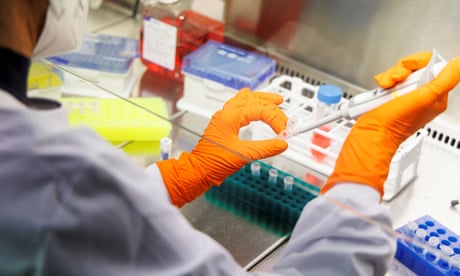With the monkeypox outbreak ongoing in the UK , some of those affected have raised concerns over delays and difficulties in contact tracing and vaccination. Joel* told the Guardian he sought advice on testing and vaccination after becoming aware a close contact had been exposed to monkeypox and had developed symptoms. However, Joel said he struggled to access testing in London over the jubilee bank holiday and was turned down for a vaccine, initially being told it was only available to healthcare staff.
Joel was subsequently confirmed as a close contact of a monkeypox case by the UK Health Security Agency (UKHSA) and was told he should have been offered the vaccine. However the delay meant he was no longer eligible for the jab. Current guidelines suggest the vaccine should ideally be given within four days of exposure to prevent or lessen the impact of infection, although it can be given to high risk individuals up to 14 days after exposure to reduce symptoms.
Joel said the process had caused him anxiety, noting one concern in the community was whether monkeypox could leave those infected with permanent scars, adding that with LGBT events that include anonymous sex continuing to go ahead it seemed likely monkeypox would keep spreading. “It has taken so long for [public health bodies] to trace [close contacts] that they are going to have to get out and effectively proactively vaccinate a lot of at risk groups to stop this,” he said. UK monkeypox outbreak not yet under control, say experts Read more Joel said he was initially told to self-isolate for 21 days but was unable to do so for financial and mental health reasons, noting he was self-employed and, in addition, did not wish those he worked with to know he was bisexual.
He has subsequently tested positive for monkeypox, and has been asked to self-isolate until all scabs drop off. According to the UKHSA, individuals who have been tested are usually informed of their result within 24 hours, with contacts identified and followed up with as soon as possible, and vaccination offered if appropriate. However the agency itself has flagged challenges , “as most cases reported having sexual contact with new or casual partners, sometimes in the context of cruising grounds or during chemsex, frequently where contact details were unavailable for tracing”.
*Matt, who also lives in London, said he had sex with a man who later contacted him to say he was experiencing symptoms and had been in contact with a confirmed case. When Matt rang 111, he was advised to isolate for 21 days but was not offered a vaccine because his contact was yet to be tested and confirmed as a case. “Desperate” to get the vaccine before he potentially started experiencing severe symptoms, he told a contact tracer he had been in touch with the confirmed case and was vaccinated five days after the sexual encounter took place.
By the time he was tested three days later, he had five lesions. “The doctor said I had one of the mildest cases he’d ever seen, and when I said I’d had the vaccine, he said that was probably why,” said Matt. But while he was not critical of the response from healthcare staff, who he said were “doing their best with a limited number of doses”, he said he thought the UKHSA’s public messaging around the disease needed to change.
“They don’t seem to be taking into account how quickly it can spread within networks of gay men where people have lots and lots of sexual partners,” he said. Adding that prior to being infected he could have up to 20 sexual partners a week, Matt noted that within spaces such as saunas or “cruise bars” few people exchange details. “If you tell people off too much, they’ll just ignore it.
But one thing they could say is, if you’re going to carry on having sex with lots of people, get their phone number so one of you can contact the other,” he said. “It’s a short-term change that seems like it would make a lot of sense. ” Sign up to First Edition, our free daily newsletter – every weekday morning at 7am BST The UKHSA told the Guardian that in addition to mandatory sick pay, in special circumstances, local authorities may grant discretionary payments to those isolating to mitigate community transmission of a high-consequence infectious disease.
The agency said vaccines were offered on a case by case basis. A UKHSA spokesperson said: “A decision on whether or not to offer a vaccine to a close contact of a confirmed monkeypox case is a clinical one made by trained health protection teams who carry out detailed assessments of each case. This includes the specific details of the exposure and the individual’s risk level.
Currently, the Imvanex vaccine is only offered to close contacts with higher risk exposure, and decisions are taken on a case by case basis. ” * Some names have been changed. .
From: theguardian
URL: https://www.theguardian.com/world/2022/jun/19/monkeypox-patients-raise-concerns-uk-tracing-delays



